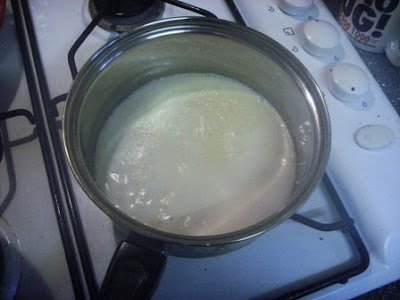Interview with Justin Gilbertson 
We Justin Gilbertson in 2009 met in Santiago (Chile). Justin Gilbertson is a vegan is originally from Iceland Vancouver (Canada) and travels for about 8 years vegan around the world. He has already vegan various places in Asia, Europe, North, Central, South America and Australia and traveled widely in his travels and campaigns for veganism, cooking and exploring the world. 1) Since when have you been vegan and why you became vegan?
I've changed in 2003 to a vegan diet, and over the next few years I went to a completely vegan lifestyle. (Details of me a huge difference between the two.) My path to veganism was very unusual. I was raised on a 4,000 hectare [40km2] large cattle and pig farm in the prairies of central Canada . I grew up with a proximity to these animals, these animals have loved and then killed but in the end the same animals, without ever thinking about it. I mean, when you grow up under these conditions in the country in a farming area, do you think that this is normal, right? It has never really "click", only a few years later.
Then when I went away to university, I went a bit die Augen auf. Aber erst als ich anfing, die Welt zu umreisen, wurde ich besser über das Thema informiert. Auf meiner ersten weltweiten Reise durch Australasien traf ich einige Tierrechtsaktivisten, mit denen ich mich viel über Veganismus und Tierrechte unterhielt. Von da ab, je mehr Informationen ich bekam, war es desto einfacher, mich dann permanent umzustellen.
Ich glaube fest daran, dass wenn jemand einmal anfängt, die Wahrheit über die Tier- und Landwirtschaftsindustrien herauszufinden, dass man dann schon völlig ignorant sein muss, wenn man dann nicht vegan wird.
2) 2008/2009 bist du per Anhalter von Alaska nach Santiago (Chile) gereist. Auf dieser einjährigen Reise fandest du es da sehr schwierig, veganes Essen zu finden, da du ja ständig unterwegs warst?
Es hat ehrlich gesagt achtzehn Monate von Anfang bis Schluss gedauert! Nicht ein einziges mal fand ich es schwierig, vegan zu sein, ganz ehrlich, weder auf dieser Reise noch auf irgendeiner anderen Reise. Ich werde die Gründe dafür in den nächsten Fragen erklären.
3) Wenn du auf Reisen bist, übernachtest du dann normalerweise irgendwo, wo du selber kochen und dein eigenes Essen zubereiten kannst? Oder kaufst du normalerweise fertig zubereitetes Essen?
I eat almost never outside, except when I'm in developing countries. I'm just this week from a further seven-month tour of Europe came back, and I've been known abroad eaten - only once, and that was because I was invited someone I also buy almost never finished cooked food, because I think it nutrients. and most importantly, geschmacksarm. I also find it stupid simple, what it costs to eat out. Most meals that are friends of mine indulge in vegan restaurants, have a price for which I lost a week's ration of food, or more, could buy.
I love to cook. I love to save even more good food from containers. I can almost always find somewhere Lebsmittel discarded, or if not, then I go to markets and buy fresh food and cook yourself. I travel with camping gear and a small camping stove, so I can stay outside. Otherwise I cook in the house of my hosts, or simply eat raw.
If I'm in developing countries such as India, Laos or Bolivia, to name but a few, I like to eat in restaurants because it is the locals und ihre lokale Wirtschaft unterstützt. Und natürlich ist es normalerweise sehr billig.
4) In manchen Ländern, wie z.B. den USA, Kanada oder Großbritannien, sind vegane Fertigprodukte viel einfacher erhältlich als in vielen anderen Ländern. Fandest du es schwieriger, veganes Essen zu finden, nachdem zu das reichere Nordamerika verlassen und dann von den USA die Grenze nach Mexiko überquert hattest, und dann die ganze Strecke nach Süden bis nach Chile und Argentinien? Hast du dich dann, wenn du Kanada und die USA auf der einen Seite und Lateinamerika auf der anderen Seite vergleichst, von ganz anderen Nahrungsmitteln ernährt?
Die Leute haben immer diese falsche Vorstellung, dass es so schwierig ist, außerhalb der reicherern Länder gesund vegan zu leben, aber das ist einfach nicht der Fall. Das ist vielleicht der Fall mit verarbeiteten Fertignahrungsmitteln wie veganem Aufschnitt, veganem Käse, Tofurkey usw., aber ehrlich gesagt, versuche ich sowieso, nicht viele solche Produkte zu essen, weil das nur verarbeiteter Mist mit Gewürzen ist.
In Bezug auf Lebensmittel, echte Lebensmittel, liegt Nordamerika weit hinter Lateinamerika zurück.
An dem Punkt, an dem ich nach Mexiko kam, und dann nach Zentral- und Südamerika, wurde das Essen so viel besser als in the U.S. or Canada. All the fresh fruit and vegetables that are not even in our north. The countless varieties of beans and pulses, which are from Mexico to the south a staple food, are fantastic. It felt so good to eat so well and healthy in the places where the food is also grown. I could feed myself from the corn and bean tacos in Mexico, and I would be happy.
In every country where I was, there are vegan foods that are easy to find. If you look at the staple food in almost every region of the world sees, they are always vegan, insane many varieties of rice, seaweed and vegetables in Asia, root vegetables, exotic fruits and a huge selection of legumes in Latin America. A large selection of vegan staple food in India. Even if one looks at North America and Europe, each region different kinds of vegetables, grains and legumes as staple foods. Leave off the meat and the Milchrpodukte that we, as we all know that anyway do not need.
So to answer the question: Yes, I totally ate other foods, which means I'm much better and healthier food eaten than here in North America!
5) Where are You otherwise have been in the world?
I started traveling to 2002, with a trip to Australasia. I went in five Asian countries and Australia and New Zealand. That should have been a one-year journey to enjoy, for which I should go back again to devote my life to a career and the consumer society, but the travel has inspired me. Since then I travel, and just last month I did when I was in Malta, celebrated my eight-year anniversary trip.
After my first trip I spent three years anywhere in Europe with a "base camp" in northern Scotland. I was four times in Southeast Asia, where My favorite country is Laos there. I spent six months in Northern India. I worked for six months with some animal rights organizations in Hawaii and California. I was eighteen months on my hitchhiking trip from Alaska to Argentina. I also traveled extensively in my home country Canada. Just this week I came back from seven months in Europe, where I spent most of his time to go hitchhiking across Iceland, Scandinavia, Malta and Spain.
In a month I go back for six weeks after Mexico to go with my very good friend and his Vegan Straight Edge band XTRUENATUREX on tour, because my partner and I where concert dates for a month have organized. I also have plans in mid-2011 for an indefinite time to finally go to the Middle East and Africa.
(Incidentally, I would only remark to you that I am not wealthy. In fact, I'm pretty much Gege part. I travel with a tiny budget (or completely without a budget). I enclose the only here because most people who hear of my travels to assume that such travel is possible only for the very rich. I can assure everyone that this is not the case. If you monthly costs for a car or even have a cell phone, then live and I travel most likely with less money than you extensively for only one of them. It just depends on how you live.)
6) Would you recommend any particular food to be particularly suitable provisions for the journey? Maybe you normally buy large quantities of certain foods and then have a repertoire of them in the backpack, in the event that you arrive somewhere and find nothing vegan to eat.
peanut butter! This is simply the best food that you should always have, and you'll never find me without peanut butter. Peanut butter contains a lot of calories, protein, essential fats and other nutrients, and of course it tastes great! I always try something with durable fruit or dried fruit to travel, in the event that I am feeling a bit tired and I need a little sugar. I am a chocolate freak. So it is very likely that I have more and more dark chocolate bars in my pocket. If I am no longer on the road, not knowing when I get to my next destination, I take rice or couscous and a little dry legumes, which I can cook on my stove can (red lenses are best because they only few minutes to the cooking need.). I usually have a bit of bread here, for my peanut butter.
7) Do you think it is sometimes difficult to explain why you eat no animal products, especially if people do not know what is vegan or perhaps do not understand the concept of veganism?
course! Just think how difficult it is in North America or Western Europe, where veganism is relatively widespread. Imagine trying to explain to the people or cultures that not even a word for vegetarian, vegan, let alone have. You try to explain to a poor farmer in a village with no common language, why they should not eat chicken.
To be quite honest, the politics of Nahrungsmittelpoduktion a seriously complicated and complex matter. I am now heavily involved for years with food policy, and I had as a result of this learning process often change my opinion and positions on animal rights and veganism. In many places, I explain the why not, because it just brings too many variables come into play. If I'm in a Situtaion come under some pressure, I am simply saying that it is against my principles that I then compare with their religion. That usually works.
I recommend the Vegan Passport to Travel dabei zu haben oder, bevor du gehst, wenigstens ein paar Sätze zu deinen Ernährungsgewohnheiten zu lernen. Das kann dir das Leben so viel einfacher machen.
8) Du hast eine Weile in Ecuador auf einer Farm gelebt, wo du selber Schokolade hergestellt hast. Könntest du von dieser Erfahrung erzählen? Was hast du auf der Farm gemacht und wie hast du die Schokolade hergestellt?
Die Farm hieß „Sueños”, was spanisch ist für „Träume“, und ich kann dir sagen, dieser Ort hat den richtigen Namen bekommen. Ich hatte nicht nur die Möglichkeit, Kakao anzupflanzen, zuzubereiten und damit Schokolade herzustellen, but we have grown our own peanuts to make peanut butter, which I then often combined both to make peanut butter chocolate.
I came to this farm to learn about chocolate, because I am an avid farmer and an avid chocolate consumer. I could learn everything about chocolate production and do myself. We planted some seeds, already took care of the larger trees, and learned that these trees need to survive and what they do not need. We have picked the pods and have the long process of fermentation, drying and preparation of the seeds of the cacao fruit witnessed. We roasted the seeds then and ground with an old mill machine, so that the seeds were then transformed because of the natural oils in a paste that we had to quickly form it into sheets of pure organic cocoa. It is a very long process, but to spend these months there was so wonderful, and I also took a little bit, because I could use as much chocolate as I wanted. I was quite often found in the kitchen, where I designed the chocolate with the peanut butter, we also produced, coconuts from the trees, citrus fruits combined from citrus trees and much more. We built on the six acres of rain forest area also many other food, and that was one of the most enchanting Places I've ever spent time and learned about organic farming. 9) Do you have a favorite anecdote in the context of veganism from your travels around the world?
This is not a very happy story, but the longest time I've ever spent without food, is about 45 hours in the northeastern part of Laos. I was not very well prepared, and I went to a small part of the country where the tourists rarely go. I ate before I started, and jumped on the truck that served as taxis. The first track was twelve hours flying snake through the woods and mountains. When we entered a small village, there was only one kitchen, the food cooked and prepared food, and all contained either chicken or butter. They did not even have rice, they could prepare me, and the chips and cookies that you could buy in the little shop were not vegan. I went outside to sleep hungry. We left the place the next morning with more people on the truck, and because they were all women (and chickens), the men had the back of the truck bed to hold hanging outside. But because I had so little energy that has not been doing too much fun, and the ten to twelve hours. We came slowly higher into the mountains, and it was cold, which I strained hat. Unsere nächsten zwei Stopps boten die gleichen Mahlzeiten aus Huhn und Butterreis oder Fischsuppe; und entweder konnte ich nicht ausreichend gut kommunizieren, oder es gab sonst nichts für mich. Ich ging die zweite Nacht, ohne gegessen zu haben aber mit ungefähr acht Tassen Kräutertee im Magen, schlafen. Am nächsten Morgen fühlte ich mich schrecklich, aber es waren nur noch sechs Stunden bis zu unserem Fahrziel; und noch einmal musste ich mich verzweifelt hinten vom Lastwagen hängend festhalten. Wir kamen schließlich an, und ich ging sofort in das erste Restaurant, wo sie irgendetwas auf Englisch auf ihrem Schild stehen hatten; und an dem Tag tat ich nichts außer essen und schlafen. Diese Mahlzeiten waren vielleicht einfache Rice dishes with root vegetables and fruits from the region, but those were the best meals I've ever eaten.
The moral of the story is that one should be prepared for a lot better than I did. At that time I learned a valuable lesson, and since then I always worry that I'm prepared.
10) Because I know you're a very good cook: What is your favorite dish cook for friends and strangers?
I am very happy to make pancakes and smoothies and pizza at any other time of day. It is so cheap and easy pizzas themselves completely to make, and they can make many people sick. Pancakes are typically Canadian, so I'm always happy for others because it takes for the dough just three ingredients and they taste so good with a variety of toppings or spreads (for me, of course, peanut butter - or maple syrup if I'm at home in Canada! ). And finally, because I so often get food from containers, I love the variety of soups and curry dishes to prepare with the source of vegetables. I think a hearty soup of roasted red peppers I like best.
My best advice is to make it not too complicated. A court must not twelve ingredients have and include exotic spices to taste good. Let the simple ingredients taste like they should taste like, and enjoy it.
as PDF















































